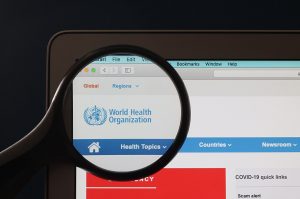If there has been one constant in Indian foreign policy over the last several years, it is this: New Delhi wants to have a decision-making seat in every global assembly and membership in every elite club. Now, India has the biggest opportunity of them all. In the midst of COVID-19, India will take over as chair of the World Health Organization’s Executive Board – its decision-making panel.
The stage could not be set up better. Even as it helps the world fight a virus, the WHO has been stuck at the center of an ongoing geopolitical spat between the United States and China. Earlier this year, U.S. President Donald Trump defunded the WHO, before criticizing it for acting as a “PR agency” for China. China struck back with a raging social media campaign against Washington.
The effects of this struggle cannot be discounted. As the world’s largest coordinating body for healthcare, the WHO has the irreplaceable role of bringing the world’s resources together – whether that be in researching a cure for COVID-19 or developing a vaccine. As the only organization with global reach, it also has the important responsibility of disseminating vital information on the pandemic to countries across the world. Being caught in the midst of a tug-of-war between the world’s two most powerful nations is therefore hardly helpful. Apart from losing out on important funds, the WHO is also facing a credibility crisis now, which undercuts its ability to fulfil these key roles.
In an ideal world, India would want to use this opportunity to strengthen its leadership credentials by doing what it does best: leveraging its relatively advanced pharmaceutical industry and playing a technocratic role. In his address to the nation this week, Indian Prime Minister Narendra Modi unsurprisingly alluded to this aspiration; he lauded Indian industry for mass producing vital equipment overnight and touted the pandemic as an opportunity for India to assume global leadership.
But global influence is nothing if not political. As a major emerging power now presiding over the world’s highest health body – during the direst global health emergency in a century, no less – India cannot escape the geopolitical tiff at the WHO.
And the see-saw has already begun. This week, the United States initiated an effort to include Taiwan as a participant at the World Health Assembly – the governing forum of the WHO. Secretary of State Mike Pompeo convened a seven-nation virtual meeting, reportedly to talk about this and other changes at the WHO being proposed by the United States. India was among the seven major U.S. allies and partners invited; the others were Australia, Brazil, Israel, Japan and South Korea. But two days later, India was invited by China and Russia as part of the Shanghai Cooperation Organization – to talk about responses to the pandemic with the rival geopolitical camp.
Traditionally, India has walked the tightrope on such sensitive, big-picture political questions. But the challenge for New Delhi is that it is not unbiased anymore. During the ongoing pandemic, India has had complaints against Chinese equipment, has stood to benefit from vital medical donations from Taiwan, and is locked in yet another round of the unending feud with China along the Himalayas. To top it all off, commentary in India is now increasingly aggressive toward the Chinese.
India has real interests in containing Chinese power, even from a broader viewpoint. China is nothing if not a rival: It has allied with Pakistan to thwart Indian initiatives at the UN and threatens India’s goal of regional hegemony in South Asia with ports and submarines.
The United States has long waited for India to act on these interests as a true geopolitical ally – and Pompeo’s meeting suggests that Washington will now be pushing more aggressively for New Delhi to take difficult political stands. But in the interest of its own leadership aspirations – regardless of whatever decision it takes – India would be very sensitive about the optics. It would want to be seen as acting out of its own initiative, rather than as a ‘secretary’ to Washington.
With Trump in charge in an election year – determined to project a strongman image – all this will be easier said than done. Last month, Trump threatened India with retaliation after New Delhi imposed an export ban on the anti-malaria drug, hydroxychloroquine. India later lifted the ban, but not without the Modi government being criticized for bowing to pressure.
India will lead the WHO for three years, so it now has the opportunity to rescue the organization from the battle that it is currently caught in. But New Delhi would have to do this while upholding its own independence, interests and credibility as an emerging global power. For years, India has avoided such sensitive decisions by walking the tightrope. That strategy will now be tested more sternly than ever before.

































